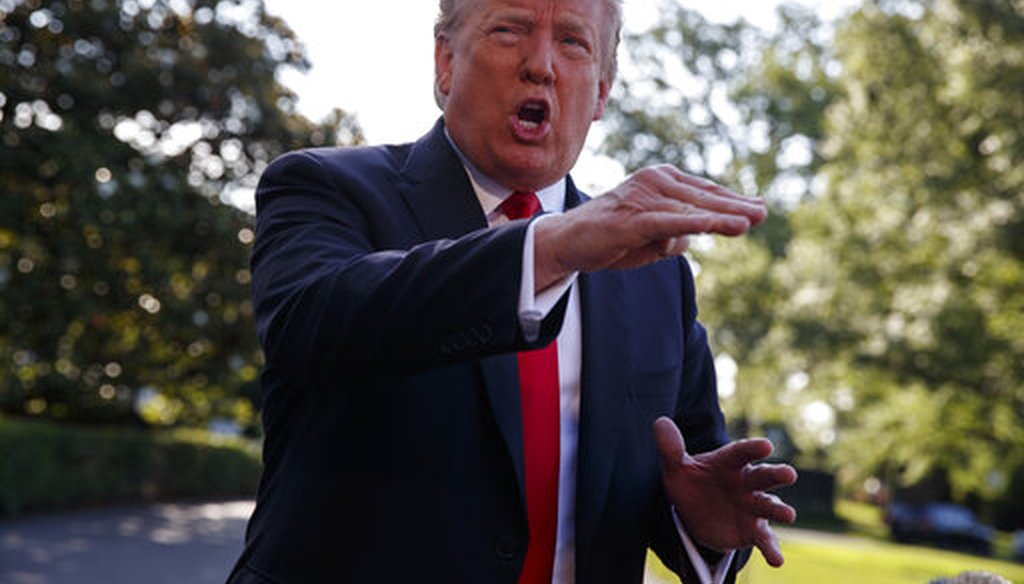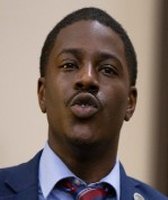Get PolitiFact in your inbox.

President Donald Trump dismissed Special Counsel Robert Mueller as "true never-Trumper." (AP Photo/Evan Vucci)
When the Justice Department first unveiled most of Robert Mueller’s Special Counsel report, President Donald Trump praised him as an honorable man. Now, Trump calls Mueller a "true never-Trumper."
Mueller delivered a few brief comments on May 29 about the results of his investigation in his first (and only) public appearance. He emphasized that the Russian government interfered with the 2016 election. He explained why charging Trump criminally was never on the table, regardless of what the investigation uncovered.
What he said fell well short of giving Trump the clean bill of health that the president has claimed.
In the hours after Mueller spoke, Trump and his campaign repeated some of the false talking points they have used for months. Here’s a sampling, fact-checked.
"President Trump has been fully and completely exonerated." — The Trump campaign
Wrong.
The Special Counsel report specifically said, "While this report does not conclude that the President committed a crime, it also does not exonerate him."
In his appearance, Mueller hammered the report’s evidence of Russia’s hand in the election. The report boiled it down this way, noting it did not have evidence that the campaign colluded with Russia, despite several encounters:
"The investigation also identified numerous links between the Russian government and the Trump campaign. Although the investigation established that the Russian government perceived it would benefit from a Trump presidency and worked to secure that outcome, and that the campaign expected it would benefit electorally from information stolen and released through Russian efforts, the investigation did not establish that members of the Trump campaign conspired or coordinated with the Russian government in its election interference activities."
As for obstruction of justice, the report examined 10 instances when Trump acted in ways that could have undercut an investigation of campaign ties to Russia. Among them, it described a frantic Trump calling then-White House counsel Don McGahn at home and ordering him to say Mueller should be removed due to conflicts of interest. McGahn refused.
"The president’s efforts to influence the investigation were mostly unsuccessful," the Mueller report notes, "but that is largely because the persons who surrounded the president declined to carry out orders or accede to his requests."
"Mueller didn’t find Obstruction." — Donald Trump 7:57 a.m. tweet
This is not what Mueller said in the report or in his public statement.
"If we had had confidence that the president clearly did not commit a crime, we would have said so," Mueller said. "We did not, however, make a determination as to whether the president did commit a crime."
"Robert Mueller would have brought charges, if he had ANYTHING, but there were no charges to bring!" — Donald Trump 7:21 a.m. tweet
Again, wrong.
In his remarks, Mueller said that under longstanding Justice Department policy, "a president cannot be charged with a federal crime while he is in office."
As an arm of the department, "charging the president with a crime was therefore not an option we could consider," Mueller said.
"I think he's (Mueller) totally conflicted because, as you know, he wanted to be the FBI director and I said no." — Donald Trump, morning remarks on the White House lawn
Other evidence contradicts this.
Former White House adviser Steve Bannon painted a very different picture for federal investigators.
"Bannon recalled that the White House had invited Mueller to speak to the president to offer a perspective on the institution of the FBI. Bannon said that, although the White House thought about beseeching Mueller to become director again, he did not come in looking for the job," the report said.
Bannon also told investigators that the "business dispute" with Mueller that Trump has raised repeatedly involved golf course fees. Bannon said he told Trump the matter was "ridiculous and petty."
"Russia did not help me get elected." — Donald Trump, morning remarks on the White House lawn
Whether Russian efforts made a difference in the election is unproven, but the Russians clearly wanted Trump elected.
The Mueller report, along with every national intelligence agency, found a singular focus by the Russians.
"Russian intelligence officers who are part of the Russian military, launched a concerted attack on our political system," Mueller said. "The indictment alleges that they used sophisticated cybertechniques to hack into computers and networks used by the Clinton campaign."
The Russian operation, Mueller said, timed the release of stolen material "to damage a presidential candidate."
That candidate was Hillary Clinton, not Trump.
Our Sources
Trump Campaign, Trump campaign statement on Robert Mueller remarks, May 29, 2019
Donald Trump, 7:21 a.m. tweet, May 30, 2019
Donald Trump, 7:57 a.m. tweet, May 30, 2019
CNN, Donald Trump remarks to reporters, May 30, 2019
New York Times, Full Transcript of Mueller’s Statement on Russia Investigation, May 30, 2019
PolitiFact, 8 times the Mueller report shows Trump, White House spread false or misleading claims, April 19, 2019
PolitiFact, In Context: Comparing Bill Barr’s summary of Mueller's findings to the publicly released report, April 18, 2019
















































